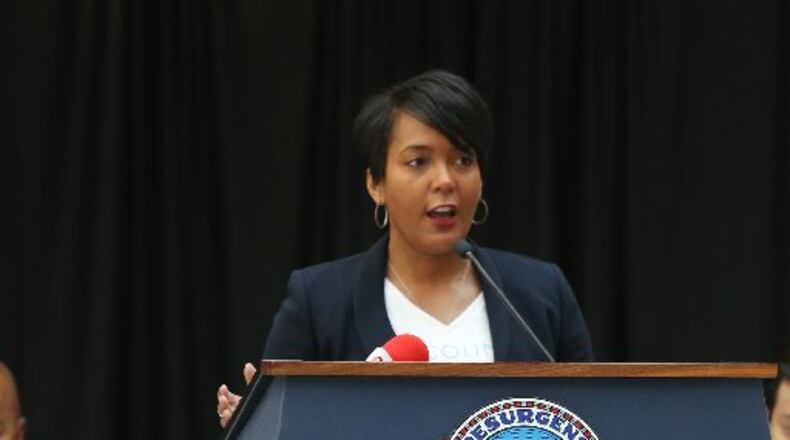The coronavirus pandemic is expected to deliver crushing budget deficits to the city of Atlanta over the next three years, and has at least temporarily wiped out the city’s plan to address its most critical need — the lack of affordable housing.
About a month ago, Atlanta leaders stood poised to issue $200 million in bonds that would enable the city to acquire vacant land on which to build affordable housing, provide money for low-income homeowners to refurbish their residences, and grant up to $20,000 in forgivable loans for down-payment assistance.
But the city’s chief financial officer told City Council Monday that it all has to be placed on hold because the pandemic is expected to cost the city at least $239 million in lost revenue and new expenses over the next three years.
CFO Roosevelt Council said city legislators should expect a sea of red ink in the coming years: a $109 million budget deficit next fiscal year, which begins July 1; $80 million in fiscal 2022; and $50 million in fiscal 2023.
All of those loses are against a general fund budget of about $670 million, which pays for most services provided to residents.
The city has a general fund reserve — essentially a savings account — of around $160 million. But financial projections were already forecasting a $40 million drop in city revenue this year because of the pandemic. And maintaining a high balance in the reserve is important to a strong credit rating, which impacts the amount of interest paid on debt.
The pandemic has already eaten into the reserve.
In March, Mayor Keisha Lance Bottoms transferred $7 million to help small businesses, provide senior citizen food programs and allow the city to purchase equipment so employees can work from home.
“Governments at all levels are facing the same uncertainty and tough choices as the City of Atlanta,” Bottoms said in a statement. “We will plan conservatively, pray for the best and rely upon the advice and counsel of health experts as the impact of COVID-19 evolves.”
City Council members voted to send the affordable housing plan back to the Finance Executive Committee, where it will be held indefinitely and with an uncertain fate.
Council member Antonio Brown, who was homeless at one point in his life, said the economic fallout from coronavirus will only increase the need.
“As we begin planning post pandemic, I think it’s even more important that we address the housing crisis in our city,” Brown said. “We will need resources when this is all said and done to be able to do that. It may not be at the capacity of $200 million dollars.”
The CFO emphasized that sending the legislation back to committee doesn’t kill the measure, and that it can be revisited when the city’s financial outlook improves. But he also told legislators that he expects a slow recovery.
“As a result of all of this, that’s why we choose to look at pushing the affordable housing bond back,” Council said.
Longtime Councilman Howard Shook said the projections weren’t surprising.
“It’s always disturbing to see what you suspect is happening confirmed,” he said.
Shook said that the city has had worse shortfalls. When Shirley Franklin became mayor in 20o2, the city faced a $80 million shortfall and had a general fund budget of over $400 billion.
“Will there be layoffs?” Shook said. “I don’t know.”
It's a question Bottoms did not address in her statement. She also did not say whether large pay raises to police officers and firefighters were safe.
But Shook added that he felt comfortable with some of the steps the administration had already taken such as placing a hiring freeze on non-essential employees. Shook said he thinks Bottoms is committed to maintaining the public safety raises.
A billion-dollar plan
Bottoms made affordable housing a centerpiece of her 2017 mayoral campaign.
Her plan promised raising $1 billion for an affordable housing trust fund to keep longtime residents from being displaced, and to allow middle income workers to live close to their jobs. She later said her billion-dollar plan included money already committed to affordable housing.
But so far Bottoms' most significant legislative victory was getting a $5 billion deal to develop downtown's Gulch passed by City Council. That deal included up to $1.9 billion in public subsidies, and critics argued the tax incentives were too large and that the city should have demanded more affordable housing in exchange.
In February, Bottoms issued an executive order calling for a $100 million bond issuance dedicated to affordable housing issues.
The amount was far less than what was recommended by HouseATL, a nonprofit comprised of business, nonprofit, and city leaders, who wanted Bottoms to issue $250 million in bonds, with those dollars distributed over a period of a few years.
And at the time of the order, city leaders declined to say if they planned to take on additional debt for affordable housing.
The legislative process has become strained after city council added an additional $100 million in bonds to the legislation.
About the Author
Keep Reading
The Latest
Featured


